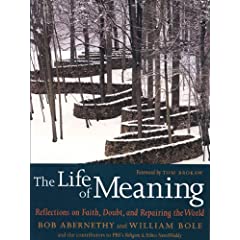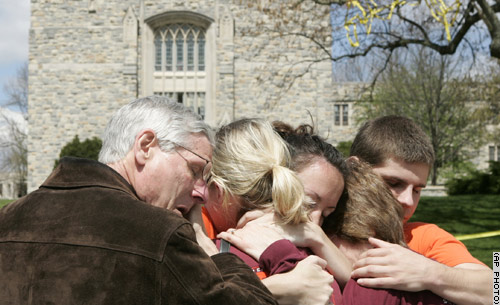Book: Why Horror Attracts, and How We Memorialize It

In the chapter titled “Staring Down the Gods of War,†Chris Hedges, a former foreign correspondent for The New York Times, tells Religion and Ethics Newsweekly that the intensity of combat can “very swiftly become an addiction….You are thrust into the present in a way that is like a drug. I mean, even the colors are brighter.†The Virginia Tech violence was, in a sense, a three-hour war, Seung-Hui Cho versus the world. And just as war movies, war reenactments and other war mythologizing are perennially popular, so the public has returned again and again to dip into the seemingly endless stream of media content, which now includes portraits of the individual victims, narratives of Cho’s troubling past, and even interactive graphics that retrace the killer’s steps last Monday.
The rush of violence attracts, says Hedges, author of the 2003 book, War Is a Force That Gives Us Meaning. Although he is still traumatized by his memories of the former Yugoslavia and other war zones – unable to sit through the Lord of the Rings movie with his son, for example – he identifies himself with friends from Sarajevo who “sat around at the end of the war, and they didn’t miss the suffering and the death, but they also realized that this was probably the fullest moment in their life. There was a kind of nostalgia for that, a sense of that comradeship, a sense of that excitement. Yet that kind of lifestyle or that kind of rush can probably never be re-created.†The intensity of feeling surrounding memorials for the Virginia Tech victims seems to reflect this same phenomenon: while we are horrified by the violence, we cherish the satisfying, if bittersweet, feeling of solidarity it engenders.
In the chapter “Evil Acts, Sacred Places,†Edward Linenthal, whose insight into the process of memorializing violent mass death is increasingly in demand, tells Religion and Ethics Newsweekly’s managing editor, Kim Lawton, that “an unsettling collective effervescence†follows public tragedies as people focus on and celebrate individual acts of heroism. “Often we fixate on how these catastrophes bring us together when, in fact, they bring us together and tear us apart at the same time,†says Linenthal, a professor of history at Indiana University, Bloomington; a member of the Flight 93 National Memorial Federal Advisory Commission; and an author of books about U.S. battlefields, the Oklahoma City bombing and the U.S. Holocaust Memorial Museum.
Communities often fight over how memorials should be constructed, and Linenthal hints at questions that Virginia Tech community members will soon face: Should Norris Hall, main site of last Monday’s violence, be closed or even destroyed? Who “owns†those classrooms now – the victims’ families, the college, the nation? That type of conflict, Linenthal notes, continues over the

